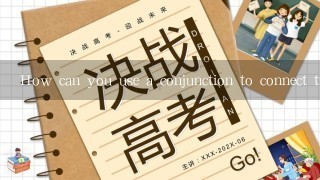How can you use a conjunction to connect two or more words phrases or clauses?

Sure, here's how you can use a conjunction to connect two or more words phrases or clauses:
1. Use a coordinating conjunction:
- Coordinating conjunctions connect two or more words phrases or clauses that are equal in meaning.
- Examples: "The dog, the cat, and the bird" or "The book, the chair, and the table."
2. Use a subordinating conjunction:
- Subordinating conjunctions connect a dependent clause to a main clause.
- Examples: "The dog, which is a good swimmer, went for a swim." or "The book, which I borrowed yesterday, is overdue."
3. Use a correlative conjunction:
- Correlative conjunctions connect two or more words phrases or clauses that have the same meaning.
- Examples: "The rain, the sun, and the clouds" or "The dog, the cat, and the bird, all love to play."
4. Use a transitional conjunction:
- Transitional conjunctions connect two or more clauses that are related in time or cause.
- Examples: "The dog, which I saw earlier, was playing with the cat." or "The rain, which began earlier, eventually stopped."
5. Use a modal conjunction:
- Modal conjunctions express a possibility, obligation, or permission.
- Examples: "You can go, but you must be careful." or "I would like to go, but I am busy."
6. Use a compound conjunction:
- A compound conjunction is a group of two or more words phrases or clauses that is connected by a coordinating conjunction.
- Examples: "The dog, the cat, and the bird flew to the park." or "The book, the chair, and the table were all pushed together."
7. Use a phrase conjunction:
- A phrase conjunction is a group of two or more words phrases that is connected by a coordinating conjunction.
- Examples: "The dog, the cat, and the bird sang a beautiful song." or "The book, the chair, and the table were all put together."






































































